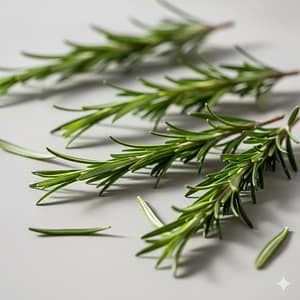- Home
- Rosemary

I. General Information
A. Scientific Name:
Rosmarinus officinalis (syn. Salvia rosmarinus)
B. Alternative Names:
Anthos (ancient Greek), Romero (Spanish), Romarin (French)
C. Pronunciation:
/ˈroʊzmeri/
II. Sourcing and Origin
A. Source:
A woody, perennial herb from the Lamiaceae family.
B. Geographic Origin:
Native to the Mediterranean region.
C. Method of Processing:
The leaves and flowering tops are used to create dried herbs, essential oils (through steam distillation), or extracts.
III. Properties and Uses
A. Physical Properties:
A green, needle-like leaf with a strong, resinous, and herbaceous aroma. The essential oil is clear and highly fragrant.
B. Chemical Composition:
Rich in volatile oils: cineole, camphor, α-pinene.
Contains antioxidants: rosmarinic acid, carnosic acid, carnosol.
Vitamins: A, C, B6.
Minerals: Calcium, iron, magnesium, potassium.
C. Primary Uses:
Skincare: Antioxidant-rich, protects against free radicals, improves circulation, and tones skin.
Haircare: Stimulates follicles for hair growth, reduces dandruff, strengthens roots, adds shine.
Wellness: Improves memory and focus, supports digestion, relieves muscle pain, boosts circulation.
Culinary: Flavoring in Mediterranean cuisine, used in meats, soups, breads, oils, and marinades.
Household: Natural air freshener, insect repellent, ingredient in DIY cleaning blends.
D. Key Benefits:
Can help with dandruff and an itchy scalp; some studies suggest it may help with hair growth; protects skin from free radical damage.
IV. Safety and Considerations
A. Potential Allergies:
Can cause skin irritation in some individuals, especially if the essential oil is not diluted.
B. Best Practices for Use:
Always dilute rosemary essential oil in a carrier oil (like jojoba or olive oil) before applying it to the skin or scalp.
C. Special Precautions:
Generally safe in culinary amounts.
Essential oil should always be diluted before topical use.
Avoid excessive internal use; may cause nausea or spasms.
Not recommended in high medicinal doses for pregnant women, epileptics, or individuals with hypertension.
V. Fun & Educational Facts
A. Historical Context:
In ancient Greece, scholars wore wreaths of rosemary during exams to help improve their memory.
B. Did You Know?
Rosemary contains natural compounds that are effective at combating bacteria and fungi.
C. DIY Recipe Idea:
Rosemary Hair Growth Oil - Mix 5-7 drops of rosemary essential oil with 1 tbsp of jojoba oil. Massage into the scalp and leave on for at least 30 minutes (or overnight) before washing.
